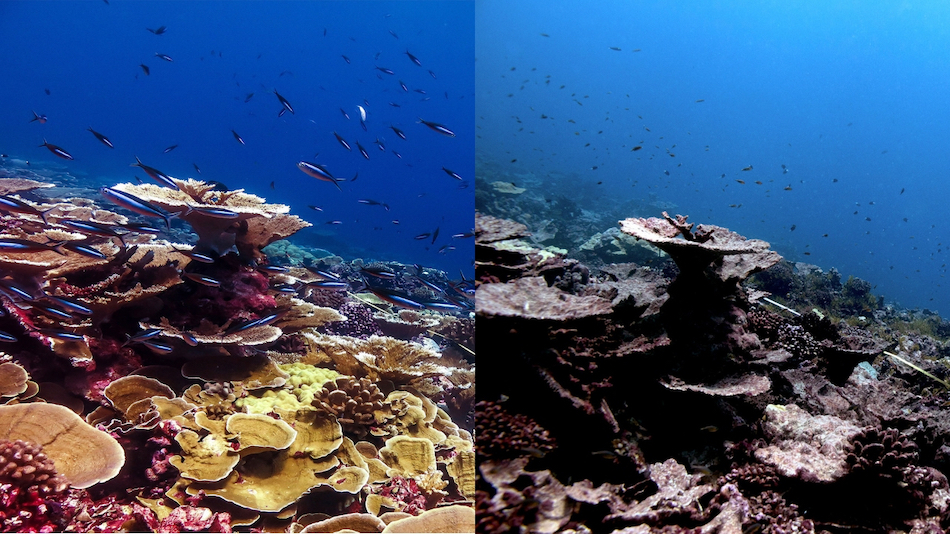Tourism and climatic changes are two sides of a coin that cannot exist without the other. The tourism industry cannot thrive unless there is a stable climate. Who will admire the beauty of pristine beaches, majestic mountains, and breathtaking lakes if there are risks of flood, forest fires, or hurricane? I am sure you will agree that climate change has a huge impact on the inflow and outflow of travelers in any given country. In this article, we will focus on its influence on tourism in Asia, and how as travelers, we can adapt to the changes to mitigate its effects.
5 Major Impacts of Climate Change to Tourism in Asia
Destruction of Coral Reefs and Natural Coastal Areas
Think about holidays, and we instantly conjure images of us basking and diving in the coastal regions, but let’s not forget that our favorite destinations are extremely vulnerable to climate changes. Tourism business in coastal areas is highly dependent on natural resources such as beaches, coral reefs, forests, and alpine areas.
Can you imagine coastal erosion robbing the beauty of coral reefs in the next three decades? Similarly, deforestation to develop these areas to accommodate more tourists also affect the ecosystem and increase carbon emissions. When we travel to any destination, it involves various modes of transportation, which further adds up to carbon emissions.
Rising Sea Levels Will Submerge Coastal Regions & Islands
Our planet will soon experience a rise in sea-level, temperature increases, and other weather extremes in the next few years. It may sound too farfetched, but rising sea levels can actually submerge small islands and some part of coastal regions. Our children and grandchildren may never be able to see some of nature’s beauty that we have taken for granted.
Winter Holiday Destinations Will Suffer Greatly
A rise in global temperature means we have longer summers and shorter winter seasons. This is likely to melt the permafrost and glaciers that are major sources of attraction for tourist. This may also cause potential issues in water availability in the long-term. If you had to cancel your plans to ski in the mountains due to less snow or shorter winter in the last few years, you are not alone. Besides having a huge impact on ski tourism, melting of snow-capped mountains can also increase the risk of natural hazards.
Frequent Extreme Weather Will Make The Situation Worse
Eco-tourism is an important pillar of the tourism industry, and it is heavily impacted by climate change. Who wants to go for a fun vacation and get caught in storms, heat waves, droughts, heavy rainfall, or typhoons? These unfavorable weather events are expected to worsen and affect tourism in island areas. If your plans for an exotic Asian holiday includes a visit to the hot springs and old caves, you will be alarmed to know that they may soon be a thing of the past. There’s an extreme dip in the hot spring tourism and severe floods eroded the caves, causing financial loss in the lake and river destinations.
What We Can Do As Responsible Tourists
Travelling is great as visiting new places refreshes the soul and gives us an insight into different cultures and heritages. However, as tourists, it is our responsibility to adapt to climate change and do our bit to save the tourism industry. Here’s how we can play our part to ensure that the lofty mountains, islands, and glaciers stay long enough for future generations to enjoy.
Protect the lovely beaches
We mostly see the glamorous side of popular Thailand beach destinations such as Koh Samui and Phuket. However, overdevelopment of these sites and piles of wastes after parties and the likes scar these beaches. One excellent example is Maya Bay on the uninhabited Ko Phi Phi Leh Island. The famed paradise lagoon was forced to close due to the sustained ecological damage caused by the five thousand tourists that visited it every day.
Similarly, the Philippines closed Boracay Island for rehabilitation for a few months in 2018. The powder-fine, white sand beaches, the lively bars, restaurants, and resorts that once lured tourists to what was dubbed “the world’s best island”, were all placed on a standstill upon the conclusion of island’s environmental crisis.
Be a responsible tourist. Throw wastes only in the bins. If you don’t see any bins near you, take your wastes with you until you find a proper place to dispose them.
Use the island resources responsibly
The islands have limited resources so be cautious about water usage when visiting the less-developed islands. We must also be aware of the waste disposal options and avoid throwing plastic bags and bottles around the coastal areas. Several rare green sea turtles live off the cost in Thailand and swallowing a plastic bag thrown by us can possibly kill them. Fishing is an enjoyable sport but reckless fishing can endanger the exotic species and cause undue stress to the aquatic life. So, let’s be a responsible tourist and save exotic destinations from losing their charm.
Enjoy watersports without disturbing the sea and life within
Snorkeling or diving is a great way to explore the beautiful underwater world but make sure you don’t step on corals or drop the anchor on live corals. Hiring a local trainer to accompany undersea activities will ensure that you snorkel and dive without disturbing the ecology. We can also educate ourselves about special areas like the ‘Turtle Island’ to ensure we don’t disturb their nesting sites. Another popular water sport is Jetski but it can pollute the water and disturb the aquatic animals. If we enjoy water sports responsibly, we can save the sea and underwater creatures to continue invigorating us.
Inform and encourage others to take part
Mother nature isn’t really calling us to do great things. But to be able to turn things around, the most effective way is through little acts done by as many people as possible, if not all. We should all be advocates, teachers, and examples to others.
As they say, the opposite of love is indifference. And right now, indifference, ignorance, and denial are definitely among the biggest hindrances to the recovery of the planet.
Conclusion
The tourism industry will continue to be affected by climate change, resulting in soaring temperatures, a rise in sea level, and extreme weather events, unless we take action. As responsible tourists, it is our duty to adapt to the climatic changes and take conscious measures to reduce carbon footprints. The good news is that the government is also taking steps to save the environment and prevent climate changes that can be detrimental to the tourism industry. With consistent efforts by the government, tourism boards, and travelers adapting to the climate changes, our beaches, lakes, mountains, and forests will continue providing happiness to generations.
Featured image by news.nationalgeographic.com







